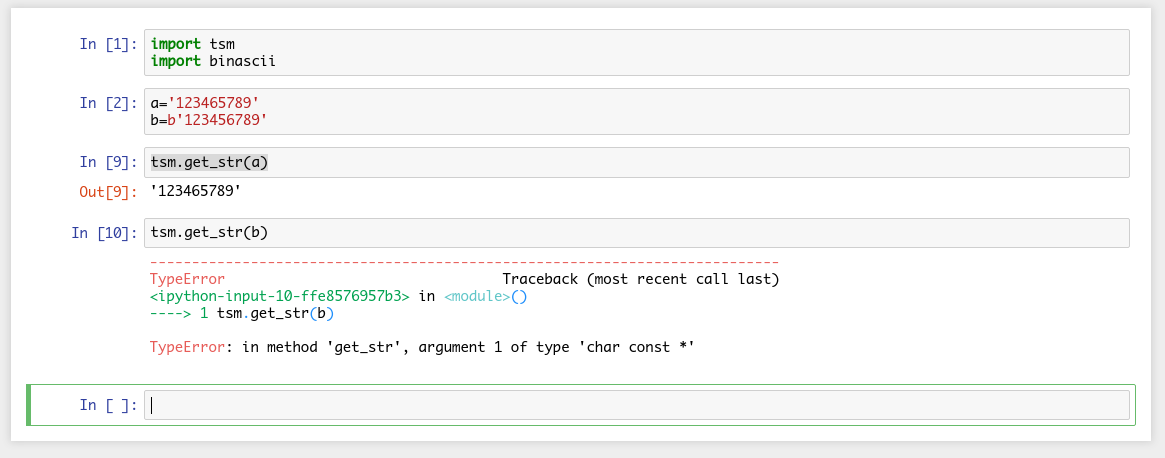SWIG Python-C封装 char*相关问题(1)
2017-08-23 00:00
176 查看
相关资料SWIG-Python:http://www.swig.org/Doc3.0/Python.html
返回类型相关资料:http://www.swig.org/Doc3.0/Python.html#Python_nn22
SWIG里面对于char *的使用严格限制,防止内存泄露,毕竟这个东西没有任何的验证机制,但是对于封装C/C++包装,指针类型的是不可缺少的东西。
不说理论了,直接从事件做起。
example 1:处理string相关的问题初体验

根据测试函数只会接受string类型,bytes类型不接受。所以目前的配置只适合写string相关的函数。
根据以上结论,把函数写的复杂些
example2 :扩展string处理

输入为string类型时候,可见,可以完美运行。
不过根据官方文档说明:
所以我们需要在interface文件中修改为
返回类型相关资料:http://www.swig.org/Doc3.0/Python.html#Python_nn22
SWIG里面对于char *的使用严格限制,防止内存泄露,毕竟这个东西没有任何的验证机制,但是对于封装C/C++包装,指针类型的是不可缺少的东西。
不说理论了,直接从事件做起。
example 1:处理string相关的问题初体验
c -->
#include "string.h"
char * get_str(char * str1)
{
return str1;
}
<--
i -->
%module tsm
%{
//头文件
extern char * get_str(const char * str1);
%}
extern char * get_str(const char * str1);
<--
根据测试函数只会接受string类型,bytes类型不接受。所以目前的配置只适合写string相关的函数。
根据以上结论,把函数写的复杂些
example2 :扩展string处理
c -->
#include "string.h"
#include <stdlib.h>
#include <stdio.h>
char * get_str(char * str1)
{
return str1;
}
char * get_str_addheader(char * str1)
{
char * odata=(char *)malloc(100);
sprintf(odata,"%s:%s","Header",str1);
return odata;
}
<--
i -->
%module tsm
%{
//头文件
extern char * get_str(const char * str1);
extern char * get_str_addheader(char * str1);
%}
extern char * get_str(const char * str1);
extern char * get_str_addheader(char * str1);
<--
输入为string类型时候,可见,可以完美运行。
不过根据官方文档说明:
9.3.3 Using %newobject to release memory
If you have a function that allocates memory like this,
char *foo() {
char *result = (char *) malloc(...);
...
return result;
}
then the SWIG generated wrappers will have a memory leak--the returned data will be copied into a string object and the old contents ignored.
To fix the memory leak, use the %newobject directive.所以我们需要在interface文件中修改为
...
if (alloc1 == SWIG_NEWOBJ) free((char*)buf1);
free((char*)result);
...
i -->
%module tsm
%{
//头文件
extern char * get_str(const char * str1);
extern char * get_str_addheader(char * str1);
%}
%newobject get_str_addheader;
extern char * get_str(const char * str1);
extern char * get_str_addheader(char * str1);
<--
相关文章推荐
- SWIG Python-C封装 char*相关问题(3)
- SWIG Python-C封装 char*相关问题(2)
- python处理多时区相关问题
- error C2664: “int CWnd::GetWindowTextW(LPTSTR,int) const”: 不能将参数 1 从“char [10]”转"相关的问题
- python相关问题总结
- Char *p="sssss"相关问题
- java 调用python的相关问题说明与解决
- python2.7安装Matplotlib相关问题
- python 编码相关问题总结
- Linux下Python的一些基础相关问题(1)
- swig 把c/c++ 封装成python可调用的so文动态链接库
- python发送邮件相关问题总结
- Python2.x中str与unicode相关问题的解决方法
- python中文字符乱码(GB2312,GBK,GB18030相关的问题)
- Python中的时间相关问题
- python安装,连接Mysql出现的问题相关总结
- python ssl相关问题说明
- python文件IO及其相关问题
- python: import模块的相关问题
- 【待整理】Python中的编码问题和相关error
